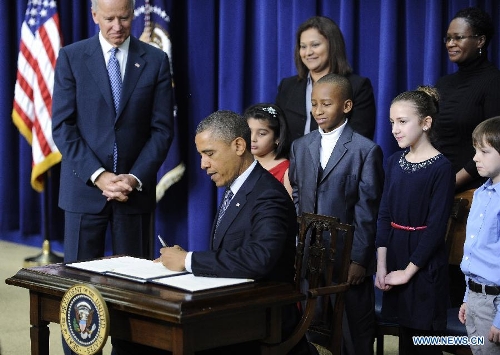Political inertia hinders gun control action

Yesterday, US President Barack Obama announced a series of gun control proposals, considered extremely tough by commentators. In fact, these proposals just reinstate former policies of prohibiting certain forms of firearms trafficking and allowing for background checks under some circumstances not currently covered, such as gun shows.
But there has already been strong dissent from the gun lobby, and analysts believe the US will have a difficult time controlling guns. It will certainly be impossible for the country to ban guns.
There is clearly an urgent need for gun control in the US, where over 30,000 people are killed by guns a year, more than the number of Americans that have died in all the years of the Iraq war. Guns are part of the history of the US as a country of immigrants, but the situation has changed over the last 200 years. It is recognized that guns are part of America's traditions and national situation, and cannot simply be regarded as bad. But they have led to more and more problems. The difficulties in promoting gun control show that US society lacks authorities willing and able to push forward reform.
US gun management is a mirror. It shows us how different China is from the US. It would be hard to imagine if everyone in China has a gun. It also shows the enviable capacity of US self-government at the grass roots level, because only a few of the 300 million guns in the country are used for harmful purposes.
However, even in the US, there is a lot of harm caused by the failure of authorities to promote reform, which has become an institutional defect of the country. It can avoid dictatorship, but at the same time, consensus cannot be achieved to break through key problems.
US stalemate in gun control warns us that China's social transition cannot be developed into a process of decreasing of authorities. There will be many dissenting voices in China because every reform will lead to an adjustment of people's interests. At this time, reformists should have enough power to manage conflicting opinions in society, instead of being mastered by them. They should dare to and have the ability to go against the odds and make decisions which can best meet the interests of the majority of people.
There have been detours and mistakes in the process of China's reform. However, the general direction of the reform is correct and we have made great progress. China's reform has not finished. We have to constantly build our political democracy, but in the meantime, we still need to have powerful decision-making mechanism and decision-makers.
The difference in gun control between China and the US is a vivid example of the current situation. It tells us that China has to seriously observe the world and gain experiences as well as lessons. Also, China should firmly insist on its road of development which is in accordance with its own national conditions.
It is politically naïve and culturally romantic to hold the opinion that everything in the US can be a model or a standard for China.